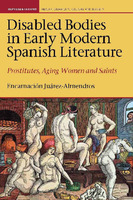Disabled Bodies in Early Modern Spanish Literature
Prostitutes, Aging Women and Saints
Author(s)
Juárez-Almendros, Encarnación
Collection
Knowledge Unlatched (KU)Number
102602Language
EnglishAbstract
Disabled Bodies in Early Modern Spanish Literature examines the concepts and role of women in selected Spanish discourses and literary texts from the late fifteenth to seventeenth centuries from the perspective of feminist disability theories. It explores a wide range of Spanish medical, regulatory and moral discourses, illustrating how such texts inherit, reproduce and propagate an amalgam of Western traditional concepts of female embodiment. It goes on to examine concrete representations of deviant female characters, focusing on the figures of syphilitic prostitutes and physically decayed aged women in literary texts such as Celestina, Lozana andaluza and selected works by Cervantes and Quevedo. Finally, an analysis of the personal testimony of Teresa de Avila, a nun suffering neurological disorders, complements the discussion of early modern women’s disability.
Keywords
Literature; Literary Theory; Literature History and Criticism; Fiction; Novelists and Prose Writers; Literary Studies - c 1500 to c 1800; Hispanic and Latino Studies; Spain; Modern Period; Women's Bodies; DisabilityDOI
10.2307/j.ctt1ps32vmISBN
9781786948441OCN
1100523315Publisher
Liverpool University PressPublisher website
https://www.liverpooluniversitypress.co.uk/Publication date and place
Liverpool, 2017-12-31Series
Representations: Health, Disability, Culture and Society,Classification
Literary theory


 Download
Download